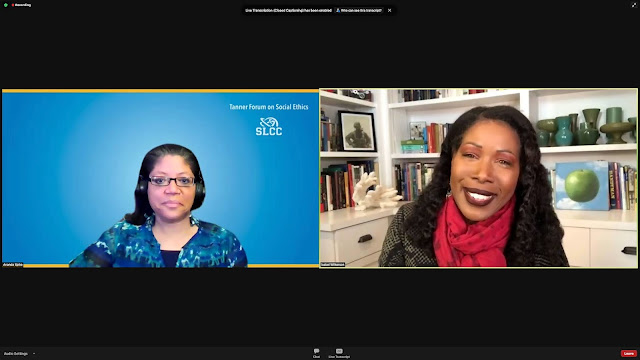Award Winning Author Isabel Wilkerson Speaks about Social Ethics of Caste and Hierarchy at Tanner Forum

|
|
Left- Ananda Spike, SLCC Assistant Professor and Q&A Moderator Right- Isabel Wilkerson, Author and Tanner Forum Guest Speaker. |
Faculty, staff, students and community members tuned in Nov. 4 to watch award winning author Isabel Wilkerson examine and address recent events related to civil unrest and social justice as part of her presentation for Salt Lake Community College’s annual Tanner Forum on Social Ethics.
Wilkerson, the first black woman in American journalism to win the Pulitzer Prize for her work as Chicago Bureau Chief of the New York Times in 1994, spoke for about forty-five minutes and addressed previously submitted questions afterwards with moderator Ananda Spike, SLCC assistant professor of Humanities. The New York Times bestselling author of Caste: The Origins of our Discontents and The Warmth of Other Suns spoke with emotion and passion as she described the patterns and connections of an unseen caste system inherent in the founding of America, the history of civil rights and recent events, including the killing of George Floyd.
Wilkerson started her day at SLCC taking part in a livestreamed student Q&A at noon. “Wilkerson spoke to SLCC students and faculty, stressing the importance of the first amendment and commended SLCC’s commitment to free and fair journalism,” said Morgan Workman, editor-in-chief of The Globe, who moderated the session.
For a second time, the ongoing pandemic forced the college to present the forum online in a livestream event rather than an in-person address in the Grand Theatre. Eight hundred and twenty-five people registered to view this year's forum.
Wilkerson began her presentation by recounting current events and ties to the history of systemic racism in America. Wilkerson told the audience about Dr. Martin Luther King’s visit to India in 1959 and King’s conversation with a principal at a school with students from the lowest ranks of society in India known as untouchables. The principal compared the caste system in India to what was then happening in America during the Jim Crow era. Wilkerson talked about how that conversation influenced King’s thought process about caste and how it applied to the 20 million African Americans in the United States at that time.
Wilkerson explained how caste systems are entrenched in our history and how the continuation of such systems adversely affects our present-day society. “We’re in the midst of a political upheaval that continues to show us the ruptures we’ve inherited as a society,” said Wilkerson.
Several times during her address Wilkerson wiped at tears as she described recent events, including the continuing pandemic and low vaccination rates, the killing of George Floyd, and the siege of the U.S. Capital.
The author implored the audience to better understand and learn from history. “Not enough of us know the true history of our country,” explained Wilkerson. She said that because we have not addressed this history let alone reconciled it is in part why we continue to experience political and societal divisions in the U.S.
“The mission of Dr. King has not been completed,” said Wilkerson and she encouraged the audience to take up the work. “It will be up to all of us, to make it so. Not only for our communities, our children, our country but for the species and the planet itself,” said Wilkerson.
During the Q&A, Wilkerson explained the practice of radical empathy as necessary in that work. She spoke of how radical empathy goes further than just trying to imagine what we might do placed in someone else’s situation. “We must allow our hearts and minds to try and truly understand what another person’s experience is, not just what we would do if in their situation,” said Wilkerson.
One of Wilkerson’s final thoughts was a call to SLCC’s community to practice radical empathy. “Each of us have far more power than we think we do when it comes to recognizing the humanity of another member of our species and acting upon that in ways that we would wish to be treated ourselves,” said Wilkerson.
Moderator and SLCC assistant professor Ananda Spike said Isabel Wilkerson’s work is important because we need to have an awareness of this unseen caste system in order to engage in effective dialogue about topics that separate us into social constructs. Spike urged the SLCC community not only to read Wilkerson’s work but to undergo a process of self-introspection regarding where one sits within this unseen caste system.
Funded in part by the O.C. Tanner Company, the Tanner Forum on Social Ethics brings nationally and internationally recognized speakers to SLCC. The forum enhances the college’s mission as a community-based learning institution that provides opportunities for students, faculty, staff and the wider community to come together for the thoughtful examination of critical issues in contemporary social ethics.

Comments
Post a Comment